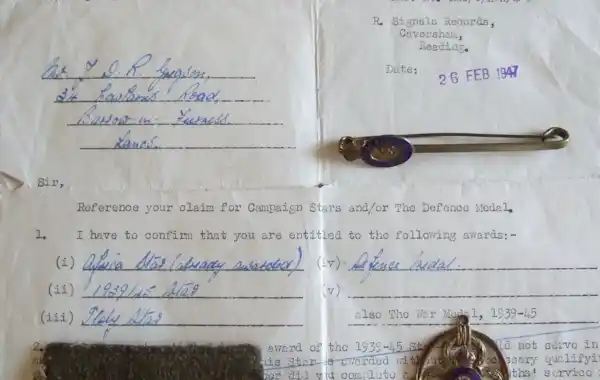27 October 2020
|
Don’t let your family war stories get lost in the mists of time. Keith Gregson shares his top tips for researching your family’s involvement in World War Two.
During the war my father (Rex Gregson 1920-1994) served in the Royal Corps of Signals and my mother (Betty Gregson née Stephens 1922-2015) in the Women’s Royal Naval Service. He was a signaller and she a telephone operator – natural positions as before the conflict both had worked in the Post Office in Barrow in Furness doing similar jobs to those undertaken in the forces.
My father’s active service took him to Egypt and Italy; my mother’s to a shore base in Northern Ireland where pilots of the Royal Naval Air Service were trained to fly from the decks of convoy escorting vessels. My father’s service lasted from 1942 to 1945 and my mother’s from 1943 to 1946 with moves to Scotland and Dorset after the fighting was over.
Documenting the war years
I am extremely fortunate to have parents who realised that, as I had become a history teacher in their later years, documenting their wartime experiences would be of use to me in the classroom. They both set to and provided me with a pile of useful material which I am happy to share here in the hope that you too can to discover similar evidence somewhere in your own family.
1. Official documents
Both my parents kept an extraordinary number of official documents including next of kin cards, financial accounts and pay and arrangements for post-war employment and life in general. The two I have chosen to feature here are my mother’s official long record of service and my father’s short record.
2. Medals and badges
My mother had a single medal which she claimed late in life and this was accompanied by a useful list of the service medals awarded during the conflict. She also had a number of intriguing small badges including one awarded for knitting clothing for the troops before she joined up and a RAF sweetheart badge from a family friend (possibly boyfriend) who sadly lost his life in the conflict.
I have assembled a collection of my father’s medals and badges – a set of ribbons which include the two general war medals but also two for service in Italy and Egypt. The others form part of his general uniform.
3. Taking it further
- Ask your cousins and more distant relations – they may have correspondence sent by your parents and grandparents, for instance. They may also have photos, or even have inherited ‘the medals’
- Investigate whether there are organisations that can help you: regimental museums and Facebook groups dedicated to local history may both be able to provide you with information, copies of photographs are more. It’s worth asking.
- Search collectable and antique sites. While this is not the same as having your ancestor’s original, it is interesting to see examples of the items they might have used and the medals they may have been awarded.








